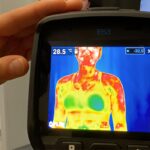The COVID-19 pandemic made data scientists of us all. From new cases to infection rates and mortality statistics, the world became eager consumers of information to wrest a sense of knowledge and control around an event that most of us had never imagined.
Yet timely, reliable and actionable data has not always been readily available and is often collected and shared in ways that made a comprehensive perspective nearly impossible.
The international community had, in fact, imagined the impact of a global pandemic and prepared for it to the extent possible. But even multilateral action was hindered by the lack of robust data to inform real-time public health policies and programmes.
Data fragmentation and gaps aren’t new, but COVID-19 has highlighted the urgent need for swift action to address these persistent challenges. In response, WHO has partnered with private sector organizations to build innovative, sustainable solutions that address pain points in countries and accelerate progress towards the health-related Sustainable Development Goals and WHO’s Triple Billion targets on healthier populations, universal health coverage and health emergencies protection.
“Since Dr Tedros began his role as Director-General in 2017, his vision has always been to transform WHO into a modern, data-driven organization,” says Dr Samira Asma, Assistant Director-General for the Division of Data, Analytics and Delivery for Impact. “The pandemic drove home our need to tackle the systemic issues that keep us from being data-driven so that we can adequately respond not only to the pandemic but also ensure…that every citizen in every country has a chance for a healthier life.”

cc Unsplash / @tbelabuseridze Preparing for the Nyepi day ceremony. Ubud, Indonesi
Without data, it is impossible to know what impact we are having on health or how we are tracking towards our goals. We are now less than 9 years away from 2030 and have no time to lose.
Building the big picture
Among the private sector partners who have answered WHO’s call to action are Avanade and Microsoft. Both organizations are actively collaborating with WHO to create the world’s first comprehensive, end-to-end data solution for global health: The World Health Data Hub.
The World Health Data Hub aims to reduce fragmentation, streamline processes, identify and resolve gaps and inequalities, and ensure data is accessible, findable and usable for all stakeholders.
“The number one challenge we have in solving humanitarian and domestic issues—whether it’s homelessness, the plight of refugees, or global health—is data fragmentation,” explains Justin Spelhaug, Global Head of Tech for Social Impact at Microsoft Philanthropies. “Everybody’s got a sliver of information, but we can’t compose a complete picture in a way that helps us design more effective breakthrough programming policy and response.”

Satellite map of European cities night. N.A.S.A. Image modified
As the steward of the world’s health data, WHO has a responsibility to make it accessible to all so that no country, city, community or person is left behind. The collection, communication and use of health data has experienced a global revolution, driven by huge advances in technology and connectivity. WHO is committed to working with partners to empower every country to join the health data revolution and grasp the opportunities it provides by transforming access to health data.
“Any IT consulting organization will tell you that your data is at the core of every single programme now in the private and public sector world. For nonprofits both small and large…it’s really their lifeblood,” says Innes Grant, Global Nonprofit Lead for Avanade. “Sometimes we take it for granted that well-funded data collection systems for statistics are readily available. It’s easy to forget that in many countries, even just their ability to gather that data may not be a priority. A big emphasis in this programme is empowering those Member States and making it easier for them to harvest data and take action on the data that’s presented to them.”
The power of the World Health Data Hub
As key technology partners, Avanade and Microsoft are working closely with WHO to deliver this ambitious, end-to-end solution with a shared commitment to establish health data as a global public good. As the ‘new home of health data’, the Hub will transform data ingestion from multiple sources. It will also provide a secure environment for countries to upload and validate their data while leveraging the latest technology in predictive analytics and data visualization for policymakers, academia and the general public.
This work depends on a strong foundation of trust. The World Health Data hub provides transparency and security across the data journey ensuring timely, credible and reliable information can be accessed to inform policy, drive intervention and save lives.
“One of the requests that Member States have repeatedly asked of WHO is to provide a seamless record of data from the time of its collection to the way it is communicated and used to drive policy and improve the performance of care, so that was a key priority,” says Dr Asma. “Then we need to conduct predictions and forecasting as well as provide insights and data visualization so the data becomes useable for the policymaker or the communicator. Our goal is to use data to drive impact in countries and in the lives of the people that we serve.”

© WHO / Lindsay Mackenzie 16 September 2020: A nurse works in the room of a COVID-19 patient at the St. Orsola-Malpighi Polyclinic in Bologna, Italy
Through partnerships, WHO draws upon the combined leadership, expertise, resources and reach of multiple organizations to scale impact and deliver a measurable impact in people’s lives. COVID-19 has underscored the need for efficient, multilateral cooperation that is responsive to unique country needs and reflects their specific priorities. The shared values of partners such as Microsoft and Avanade form the basis of effective collaboration and foster a shared vision for the future to act swiftly and bring products to scale.
“Our role is to ensure that in [the] future more and more time is spent not on the management and manipulation of data but on the front-end analysis and on drawing conclusions,” says Grant. “Ultimately, it’s about transforming the way that WHO can gather data…internally but also with Member States and bringing new capabilities to WHO that they didn’t have before.”
Global impact
While the World Health Data Hub project is focused on streamlining health data from collection to use, at its core is the reality that every data point represents a human life. From those who are living healthier, longer lives to those who are sick and seeking treatment to the health workers who care for them and the country health systems that serve their people.
“Every data point is a person. It’s an event. It’s a place. It tells a story about right now, one of humanity’s greatest challenges,” says Spelhaug. “There’s so much power in being able to unify that data across countries, across demographics, [and] across different parts of WHO and use the analytical tools that we have to understand what it’s trying to tell us.”

cc Unsplash / @benwhitephotography 2017
The pandemic has stretched country health systems to their limits and exposed inequalities that have been obscured for too long. As of May 2021, we are not on track to meet WHO’s Triple Billion targets or the health-related Sustainable Development Goals, and COVID-19 threatens to throw us further off track. Through collaboration and knowledge sharing, we can not only get back on track but accelerate progress by leveraging the innovation and expertise that public-private partnership provides.












